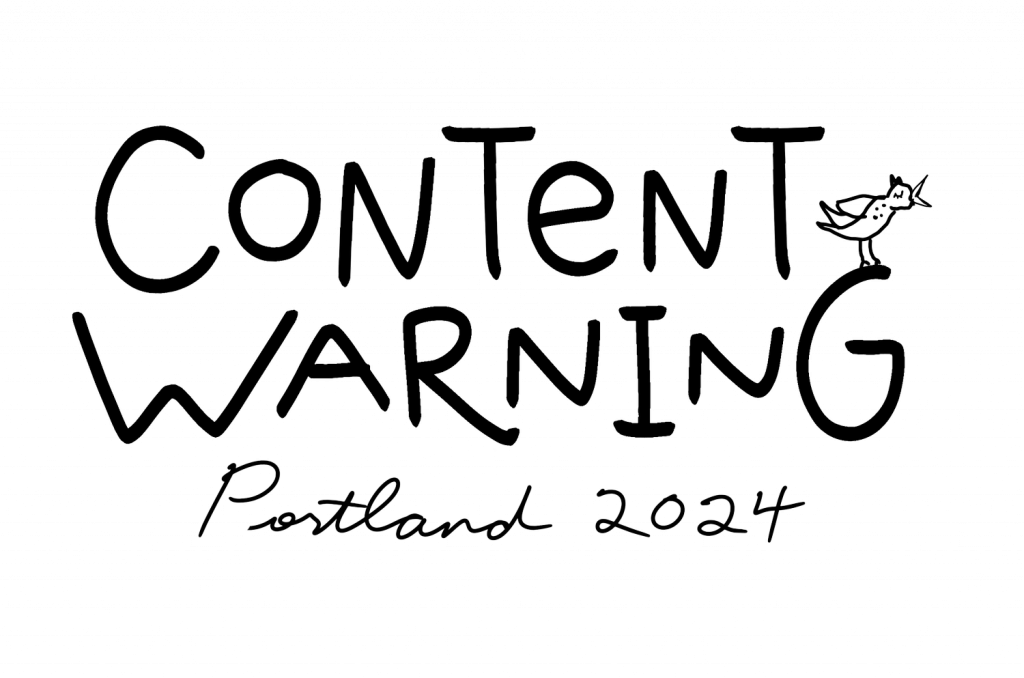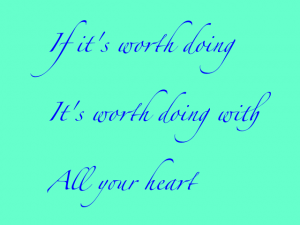Hello readers and happy Friday! Time to tackle another journal prompt from Changing Paths by Yvonne Aburrow. This week, we’re looking at chapter 5, which is titled “At the Crossroads.” Unlike the previous two chapters, I easily fell in love with the thought of blogging about one of the journal prompts at the end of this chapter. And boy, is it a doozy!
Make a list of features that any religion or philosophical system that you would consider getting involved in should not have. Your list could include beliefs, values, rituals, metaphors, and practices.
Before I start pulling out my “laundry list” and discussing it, I should note that this is today’s list of my deal-breakers. I’m not sure everything would have been on my list back in 1998 when I was making my break from Christianity. After all, my only goal in 1996 was to make peace with the fact that I was gay. I didn’t plan on changing any other aspect of my faith at that time. But that’s the thing about such lists. They change and grow as we do. We need to allow them to change. Maybe we’ll add new items to the list. Maybe we’ll take some items back off it, or at least clarify what exactly it is we’re opposed to. But let’s get on with my current deal-breakers.
Homophobia and Transphobia
Homophobia would have definitely been on my list of deal-breakers back in 1998. In fact, it was the original deal-breaker that kicked off my deconstruction process. Being a gay man who had realized that denying my sexuality and denying myself fulfilling sexual experiences and relationships was unhealthy for me, I realized that I needed a religion that accepted, embraced, and celebrated my sexuality instead.
Back then however, I did not know much about tans issues. In fact, I’m not sure I had even heard of being trans. If I had, I probably thought it was some sort of “extreme gayness” rather than something different (though often related) to sexual orientation.1
But as I got to know trans people, I saw how their own struggles were often similar to my own. Furthermore, my own trials, tribulations, and harms at the hands of my religious upbringing caused me to experience empathy and compassion for trans people. As such, I want a religion that accepts, embraces, and celebrates them as much as it does me me. In fact, this leads to my next deal-breaker.
Bigotry, Exclusion, and the Establishment of Second Class Members
That same compassion for myself and trans people continued to expand outward, causing me to oppose all bigotries and the various ways a religion might exclude certain groups of people or even treat them as second class members if they were accepted into the religion at all. So I began to see ableism, racism, and sexism as deal-breakers as well.
I will note that I don’t understand these issues and how they express themselves as well as I’m familiar with homophobia, its manifestations, and its effects. I’m still learning about transphobia too, for that matter. So this is an ongoing process for me and one that I doubt I will ever truly complete.
Self-Denigration
This was another deal-breaker that I had back in 1998 and likely the second one I added. My evangelical upbringing had stripped me of any sense of self-worth with its constant messaging that I was a sinner in desperate need of grace, which I had been literally taught was “mercy that I did not deserve.” It was this messaging and the toll it took on my self-esteem that eventually made me realize that I needed a clean break from Christianity altogether. 2
I need (and fortunately found) a religion that embraced me as the wonderful person I am, full of inherent value and worth. Sure, I’m not perfect and needed to improve in many ways. But I am valuable and am worth improving due to that value. My improvement as a person has become a gift I give myself rather than something I have to do to try to appease some deity (and then grovel before that deity when I fail to meet his standard.)
Hell (or Any Other Eternal Punishment)
This is another deal-breaker that was quickly added if it was not on my list in 1998. As I made friends outside of Christian circles after coming out as gay and relying on them for emotional support, I struggled with my belief that these same people were going to be condemned to suffer for eternity simply for believing the “wrong” things. It seemed unfair and cruel, especially considering how much they were helping me keep myself together at the time.
Later, I began to think about the whole idea of hell and realized that in general, the idea of tormenting anyone (or allowing any to be tormented) forever was pure cruelty. I could not believe any deity worth respecting — let alone worshiping — would do such a thing.
This line of thinking eventually led me to thoughts that caused me to add the next two deal-breakers.
A Focus on Retributive or Punitive Justice
As I got thinking about the cruelty of hell, I also began to question what justice was altogether. I began to realize that retributive justice and punitive justice made no sense to me.3 It does nothing to restore those harmed by injustice or improve their circumstances. And even the argument of reform does not make sense if the punishment only comes at the end of the wrongdoer’s life. There’s no time for them do anything positive with their newly reformed ways.
A Focus on the Afterlife
I came to realize that there had to be more to this life than treating it as a test for getting into the preferred afterlife or gaining more converts to join you there. I began to sense that this life was what is important and what we did here matter for what the results here mattered. As such, I realized I needed (and thankfully found) a religion that not only offered insights into how to live a good and happy life here, but sought to celebrate that life for itself.
Divine Command Theory
Divine Command Theory is the moral philosophy that morality is noting more than the divine dictates of God or a group of deities. I am not a fan of this model, because it makes the entire concept of morality arbitrary. I also find it strange — and a bit of circular reasoning — that some religious people will tell you that God declares what is good and also that God is good. If God gets to declare that he is good like that, it is a meaningless statement.
I prefer to find a standard of morality that exists outside of the arbitrary dictates of an authoritarian figure. And that brings me to my next deal-breaker.
Authoritarianism
As someone who values critical thinking and independence, I am not a fan of authoritarianism. I certainly don’t want it in my religion. i want a religion where i can think for myself, grapple with the beliefs and values presented to me. I want the freedom to question and argue with the religious leaders — and even the deities themselves. And it’s even better if they celebrate me for doing so.
I like to think of my relationships with my deities as being centered on dialogue and cooperation, not subservience and unquestioning obedience.
Exclusive Claims to Truth and Totalizing Systems
Aburrow introduces the concept of totalizing systems later in the book (Chapter 7) and defines4 it as “an exclusive or sectarian system that also subsumes all other paradigms rather than accepting that other paradigns exist alongside it.” I have seen too much value in other religions — including religions that I probably would never follow personally — to just discount them as unimportant, let alone invalid. I much prefer approach that states “this is what we do/believe and others are free to believe/do as they please.” Which brings me to my next deal-breaker.
Proselytization
I have no desire to have people convince me to join their religion, nor do I wish to convince others to join mine. I strongly believe that the search for meaning and a connection with the numinous is a deeply personal one driven by an individual’s needs and context. Trying to force people to fit their personal journey into some predefined box strikes me as a sort of violence.
This is not to say I won’t share information about my religion with others. And if someone expresses a desire to follow my religion, i will gladly help them along in that process. But that is only if they come to me seeking such aid. I do not wish to go out actively seeking converts, let alone trying to convince people they need to convert.
Monotheism
I”m not sure this is a deal-breaker so much as just something I no longer believe. I don’t think I could believe it at this point. I think a polytheistic or animistic view of the numinous makes far more sense.
A “Three-O Compliant” Deity
This term is my own invention and a bit of a nod to my career as a software engineer, which is full of such jingoistic buzzwords. What I mean by it is the qualities that some monotheists attribute to their god: omnipotence, omniscience, and omnipresence.5 I actively reject the notion that any deity possesses the first two qualities and I have my doubts about the third.
Again, I’m not sure this is a true deal-breaker as it is something I just cannot believe anymore. I think the deities have their limits.6 I also believe that the deities are still growing and learning, so they can’t possibly be omniscient.
Closing Thoughts
That’s quite the list. I’m not sure it’s complete (after all, I didn’t cover sexual ethics in general), but I think it’s a great first attempt. As I noted, I reserve the right to update this list (possibly in a future blog post) in the future.
As I wrote this post, I also thought it might be interesting to explore what I want in my religion now that I’ve indicated a bunch of things I don’t want. I may have to do a future blog post on that subject.
In the meantime, I’d love to hear from my readers. Do you agree any of my deal-breakers? Do you disagree with them? Do you have other deal-breakers? Feel free to share them and your reasoning in the comments below.




